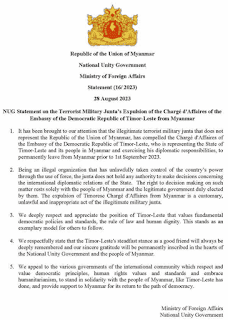Liga ba blog ida ne’e iha lian Tetum
The Government proposed its 2024 State Budget Law to the National Parliament on 23 November. The overall objective of the budget proposal is to describe the Government’s priority to empower the country’s future by investing in the most productive sectors, but none of them are in the proposed appropriations, so how is the Government seriously investing in sustainable sectors?
The proposed 2024 fiscal envelope is larger than the highest scenario the Government presented at the Budget Day meeting in September. Financing for the 2024 State Budget continues to be highly dependent on the Petroleum Fund (PF), which covers about 84% of expenditures (including most of the money carried over from balances, which were transferred from the PF in previous years).
Government officials often speak of the need to seek sustainable and diverse alternative investments. However, notwithstanding the stated intention of the 2024 State Budget, they allocate still more money to the Tasi Mane Project and Greater Sunrise, whose total costs have never been made clear. We still do not know how much these projects will benefit our people and our nation, or what their environmental, land and human rights costs and risks will be.
Up to now, our economy depends on state expenditure, mainly from the PF, and we will struggle when Timor-Leste no longer has the Petroleum Fund. Its upcoming emptiness will severely impact the whole economy, including public- and private-sector employment as well as GDP, and we are very worried.
Tasi Mane wins, essential sectors lose
Timor-Leste has already spent $650 million (plus $130 million in interest to date) from the PF to purchase participation in the Greater Sunrise joint venture, and has spent $1.3 billion more on components of the Tasi Mane Project, which the Government says is needed to develop Greater Sunrise. According to the proposed budget, the Government will spend $13 million on the Tasi Mane Project and another $13 million on Greater Sunrise in 2024.
In view of the allocations in the proposed 2024 State Budget, the Government still does not prioritize essential areas, and we are concerned that the Government’s promises to improve peoples’ living conditions, which remain a major concern, will not be kept. Allocations to the critically important functions of health, education, clean water and sanitation comprise only about 17% of the total budget.The Government has created a Unit to Combat Stunting, which will get $300,000 to provide food for pregnant mothers and small children. We think that a stronger way to combat malnutrition would be through strategic and long-term programs to promote and uplift local food, reducing domestic consumption dominated by imported food.Human resources are important pillars for the country’s development, ensuring the sustainability of the state and helping people escape from poverty and hardship. Although the Government says it prioritizes human capital investment, there is little allocation to sectors which would improve human quality. How can the state respond to this situation when the state itself does not prioritize and value its people?
Agriculture or ASEAN?
The proposed 2024 State Budget still has no concrete policy to identify pathways for diversification to create a resilient and sustainable economy. As in past years, the agricultural sector continues to be neglected, receiving only 2.2% of the total 2024 budget. It is important to prioritize productive sectors such as agriculture and fisheries because, according to the Integrated Food Security Phase Classification 2023, Timor-Leste is “one of the most vulnerable countries in the world in terms of its susceptibility to climatic shocks, such as La Niña, El Niño, and tropical cyclones.”
According to the 2019 Timor-Leste Agriculture Census, we have the potential to grow many types of food, but production is not yet able to meet domestic demand, and potential products are not being developed properly. Therefore, the policy of economic diversification should be realistic, not only an election campaign slogan.
Many people expect that joining ASEAN will benefit Timor-Leste, but we have not yet prepared our economy and important sectors such as agriculture.ASEAN will endanger Timor-Leste, as other countries can dominate our economy and we will continue to rely on products from abroad. It may also threaten our sovereignty and replace Timorese workers with people from ASEAN member countries. Although the Government considers the $4.3 million allocated for ASEAN in this budget to be a small amount, we think that ASEAN is not urgent, and that food sovereignty is more important.
Politically, the Government is very interested in joining ASEAN and hopes that integrating our economy and trade into regional and international markets will provide opportunities for foreign investment and improve our economy through job creation. On the other hand, there is still no in-depth explanation of what disadvantages Timor-Leste will face when it integrates into ASEAN, such as complying with the ASEAN free trade agreements and the responsibilities of membership.
It would be better if the budget helped farmers improve production, strengthened small processing industries and supported young people to produce livestock, fish and other products, which will be more valuable than the uncertain benefits of ASEAN.
These and other ideas are explained more fully in La’o Hamutuk’s 6 December submission (Tetum) to the National Parliament. You can find more information on the 2024 State Budget here.





























